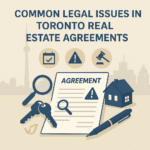Amendments to the foreign buyer ban on purchasing residential real estate in Canada

Earlier in January, 2023 came into effect the Prohibition on the Purchase of Residential Property by Non-Canadians Act (the “Ban”). Almost three months later near the end of March, 2023 amendments were announced and enacted that lifted some of the restrictions giving foreign buyers, among other things, some opportunities to invest in the development of Canadian real estate as follows:
- Change to what is a Residential Property: It is now more certain that the Ban no longer captures land (not necessarily vacant land) that does NOT contain a habitable dwelling but is zoned residential or mixed use. This means a non-Canadian (i.e. a foreign buyer) can purchase land that is zoned residential or mixed use so long as it does not contain a dwelling unit, such as a detached house, attached house, condo unit or similar building that contains 3 or less dwellings (no ban on buying multi-residential buildings of 4 or more dwelling units).
- Real estate development: Non-Canadians can now purchase Residential Property that is to be developed. Not much guidance is provided on how exactly you characterize otherwise restricted Residential Property acquired for the purpose of being developed other than there must be a clear intention that the property is for development purposes prior to its actual acquisition, regardless if it is actually developed thereafter (i.e. no actual requirement to develop and construct the proposed or intended development so long as the buyer can demonstrate good faith intentions consistent with the Ban). Some further guidance is provided in that developing means the typical process a real estate developer would undertake including planning work (e.g. zoning and official plan amendments), and evaluating the overall design, construction and undertaking to proceed. Developing could also mean redeveloping an existing Residential Property, however does not include a typical restoration or substantial renovation or remodel regardless if the building is extended or dwelling units are reconfigured, or if the use is changed from single family to multi-dwelling (less than 4 units).
- All Canadian public entities are now exempt, where as before only Canadian corporations, hence publicly listed Canadian real estate investment trusts are exempt.
- Privately held, non-publicly listed Canadian entities can now have non-Canadian owners or controllers (i.e. own equity or voting rights) provided they hold in aggregate less than 10% (formerly 3%) of the equity or voting control.
- Non-Canadian lenders can provide mortgages to others so long as it is not used as a means to defeat the Ban (i.e. the Ban includes an exemption for mortgage lenders who acquire Residential Property as a result of legitimately enforcing their mortgage, such as with a foreclosure).
- Non-Canadian work-permit holders no longer need to have filed income tax returns for 3 of the previous 4 tax years and to have worked full-time for 3 of the 4 preceding years, so long as they still have 183 days or more remaining on their work-permit at the time they purchase the Residential Property and they have not purchased more than one.
For any questions please contact the author or any real estate lawyer at Levy Zavet PC.
Read More: Foreign Buyer Ban and Anti-House Flipping Laws Implemented in 2023


